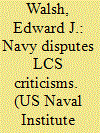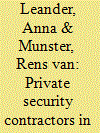| Srl | Item |
| 1 |
ID:
141165


|
|
|
|
|
| Summary/Abstract |
In spite of its sensitivity, diplomatic protection has received very sporadic scholarly attention. This article provides a comparative analysis of US and UK diplomatic security policies, focusing on the increasing use of private military and security companies (PMSCs) for the protection of foreign service and development agencies’ personnel. The existing theoretical explanations of the privatization of security tasks cannot explain why countries displaying similar material incentives and similar political and market cultures have outsourced diplomatic protection to different degrees, nor can they account for variance in the use of PMSCs by different agencies within the same country. Our analysis highlights the importance of investigating organizations’ interests in providing a more accurate explanation of the varying propensity to outsource armed protection. In both the United States and the United Kingdom, the outsourcing of diplomatic security was a resultant of foreign policy bureaucracies and military organizations’ preferences.
|
|
|
|
|
|
|
|
|
|
|
|
|
|
|
|
| 2 |
ID:
188323


|
|
|
|
|
| Summary/Abstract |
Contemporary warfare is increasingly shaped by the complex relationship between the privatization of security and technologically driven automation. On the one hand, there is a growing tendency to employ private military and security companies for a range of military support tasks. On the other hand, the growing automation of security technologies is bound to make war less manpower intensive. Combat systems will have much more autonomy and humans will be working more closely with machines than they do today. The article provides an original analysis on the interplay between the privatization of security tasks and technologically driven automation and investigates their impact on the defence industry and the armed forces. These two sets of actors are arguably among the most impacted by the multi-faceted relations between privatization and automation. Technological progress creates the need for contractors to maintain and operate platforms that militaries do not have expertise to run. However, technologically driven automation - often developed in value chains far removed from the military-industrial pipeline - might also replace private contractors in non-core security tasks. The possibility to employ automated and autonomous systems will hence impact on the already delicate balance between private contractors and publicly-funded armed forces.
|
|
|
|
|
|
|
|
|
|
|
|
|
|
|
|
| 3 |
ID:
110915


|
|
|
|
|
| Publication |
2012.
|
| Summary/Abstract |
This article examines the politics of identity work in the private security industry. Drawing on memoirs authored by British private military contractors, and using a theoretical framework influenced by symbolic interactionist thought, the article highlights the relevance of intersubjectivity to identity constitution. In particular, British contractors are found to constitute their professional identity in relation to their US military and contractor counterparts, above all by framing them as 'less-competent others'. This article makes an original contribution to the private and military security companies literature through its sociological focus on the links between national and professional self-identities and security practices on the ground. The article also explores the importance of the memoir genre as a valid textual resource which throws light on the interplay of the international and security dimensions within multinational military and militarised contexts.
|
|
|
|
|
|
|
|
|
|
|
|
|
|
|
|
| 4 |
ID:
124035


|
|
|
|
|
| Publication |
2012.
|
| Summary/Abstract |
The article reports that the U.S. Navy awarded funds to the prime contractors of its two shipbuilding initiatives, Lockheed Martin, and Austal USA LLC, including the Navy's Littoral Combat Ship (LCS) program for accessing the engineering and production challenges. It states that the Navy wants to build 55 ships by taking on and offloading various mission packages. It mentions that this may lead to the criticism of LCS shipbuilding and development of LCS mission packages.
|
|
|
|
|
|
|
|
|
|
|
|
|
|
|
|
| 5 |
ID:
077390


|
|
|
|
|
| Publication |
2007.
|
| Summary/Abstract |
This article explores the loud presence of private security contractors in the evolving and buoyant discussion surrounding Darfur. Relying primarily on statements by security contractors and industry lobby organizations, this article suggests that neo-liberal governmentality has bolstered the expert status of security contractors in the discussions surrounding Darfur. Both in Darfur and more widely, neo-liberal governmentality tends to `depoliticize' security as public debate narrowly focuses on the technicalities and costs of military solutions, while alternative political options, local knowledge and diplomatic alternatives become marginalized. Consequently, public debate may be intense (as is certainly true for Darfur) but lopsidedly centred on security restrictively understood. The depoliticizing trend tied to neo-liberal governmentality is an important change in security governance in Darfur of course, but also in Africa more broadly and beyond. However, since it works through what the editors of this issue refer to as the `complex relations between public and private, state and civil society actors' it tends to eschew analyses assuming that privatization is significant only when and if it undermines public authority and control. The account here testifies to the importance of changes in governance that involve public and private actors alike
|
|
|
|
|
|
|
|
|
|
|
|
|
|
|
|
| 6 |
ID:
068661


|
|
|
| 7 |
ID:
140111


|
|
|
|
|
| Summary/Abstract |
Although the privatisation of military support is increasingly widespread, advanced military organisations have not relied on Private Military and Security Companies (PMSCs) to the same degree. The existing scholarship on PMSCs cannot explain why countries sharing similar material incentives and similar market and political ideologies like the United States and the United Kingdom have not outsourced the same operational tasks. This article contends that introducing military role conceptions as a factor enabling or inhibiting the outsourcing of certain functions provides important insights into the scope of military privatisation, explaining why the US military has systematically privatised armed security and foreign military training, while the UK military has not
|
|
|
|
|
|
|
|
|
|
|
|
|
|
|
|
| 8 |
ID:
153620


|
|
|
|
|
| Summary/Abstract |
Contemporary development assistance often takes the form of subcontracted state-building. Foreign donors hire for-profit firms to provide services and to improve or create institutions in developing countries, particularly those experiencing internal conflict. This arrangement creates two counterproductive dynamics: first, it introduces agency problems between donors, recipient states, subcontractors, and citizens; and second, it undermines the long-run development of domestic bureaucratic capacity by creating disincentives for the host government to invest. These dynamics hinder, rather than foster, the legitimacy of state institutions. This paper summarizes trends in external support to state-building since the 1970s and illustrates subcontracted state-building with examples from Colombia.
|
|
|
|
|
|
|
|
|
|
|
|
|
|
|
|
| 9 |
ID:
084602


|
|
|